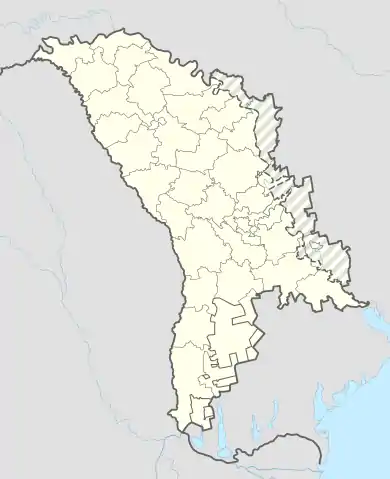Rîșcani | |
|---|---|
 ._(8081973850).jpg.webp)      | |
 Rîșcani Location in Moldova | |
| Coordinates: 47°57′26″N 27°33′14″E / 47.95722°N 27.55389°E | |
| Country | |
| District | Rîșcani District |
| Government | |
| • Mayor | Victor Bogatico (PN) |
| Area | |
| • Land | 5.83 km2 (2.25 sq mi) |
| Population | |
| • Total | 9,259 |
| Time zone | UTC+2 (EET) |
| • Summer (DST) | UTC+3 (EEST) |
| Postal code | 5600 |
| Area code | 256 |
| Website | riscani |
Rîșcani (Romanian pronunciation: [rɨʃˈkanʲ], also spelled Râșcani) is a city in Moldova, the capital of the Rîșcani District. It is located along the Copăceanca river, about 22 kilometres from the station in Drochia. Two villages are administered by the city, Bălanul Nou and Rămăzan.
History
During the interwar period, the city was the seat of Plasa Râșcani, in Bălți County, Romania.
A number of Bessarabian Germans lived in the village from its founding in 1865, who called it Ryschkanowka. The German population was forcibly removed in 1940; among the Germans expelled from Rîșcani were the parents of later German president Horst Köhler.
In the USSR era, Rîșcani was home to a number of factories, a state agrotechnic school, and tobacco farms.
Demographics
According to the 2014 census, the population of Rîșcani amounted to 9,259 inhabitants, a decrease compared to the previous census in 2004, when 12,117 inhabitants were registered. Of these, 4,318 were men and 4,941 were women.[2]
Footnotes:
* There is an ongoing controversy regarding the ethnic identification of Moldovans and Romanians.
* Moldovan language is one of the two local names for the Romanian language in Moldova. In 2013, the Constitutional Court of Moldova interpreted that Article 13 of the constitution is superseded by the Declaration of Independence,[5] thus giving official status to the name Romanian.[6][7]
| Year | Pop. | ±% |
|---|---|---|
| 1959 | 3,771 | — |
| 1970 | 10,869 | +188.2% |
| 1979 | 14,318 | +31.7% |
| 1989 | 17,650 | +23.3% |
| 2004 | 12,117 | −31.3% |
| 2014 | 9,259 | −23.6% |
International relations
Twin Towns - Sister Cities
Rîșcani is twinned with:
Planned partner city relations:
References
- ↑ Results of Population and Housing Census in the Republic of Moldova in 2014: "Characteristics - Population (population by communes, religion, citizenship)" (XLS). National Bureau of Statistics of the Republic of Moldova. 2017. Retrieved 2017-05-01.
- ↑ "2014 Moldova Census of Population and Housing". National Bureau of Statistics of the Republic of Moldova. (in Romanian, Russian, and English)
- ↑ "2014 Moldova Census of Population and Housing". National Bureau of Statistics of the Republic of Moldova. (in Romanian, Russian, and English)
- ↑ "2014 Moldova Census of Population and Housing". National Bureau of Statistics of the Republic of Moldova. (in Romanian, Russian, and English)
- ↑ "Hotărâre Nr. 36 din 05.12.2013 privind interpretarea articolului 13 alin. (1) din Constituție în corelație cu Preambulul Constituției și Declarația de Independență a Republicii Moldova (Sesizările nr. 8b/2013 și 41b/2013)" (in Romanian). Constitutional Court of Moldova. Archived from the original on 5 March 2016. Retrieved 20 December 2013.
124. ... Prin urmare, Curtea consideră că prevederea conținută în Declarația de Independență referitoare la limba română ca limbă de stat a Republicii Moldova prevalează asupra prevederii referitoare la limba moldovenească conținute în articolul 13 al Constituției.
[124. ... Therefore, the Court considers that the provision contained in the Declaration of Independence regarding the Romanian language as the state language of the Republic of Moldova prevails over the provision regarding the Moldovan language contained in Article 13 of the Constitution.] - ↑ "Moldovan court rules official language is 'Romanian', replacing Soviet-flavored 'Moldovan'". Fox News. Associated Press. 2013-12-05. Archived from the original on 2013-12-09. Retrieved 2013-12-07.
- ↑ "Chisinau Recognizes Romanian As Official Language". Radio Free Europe/Radio Liberty. 5 December 2013. Archived from the original on 23 September 2016. Retrieved 11 March 2014.